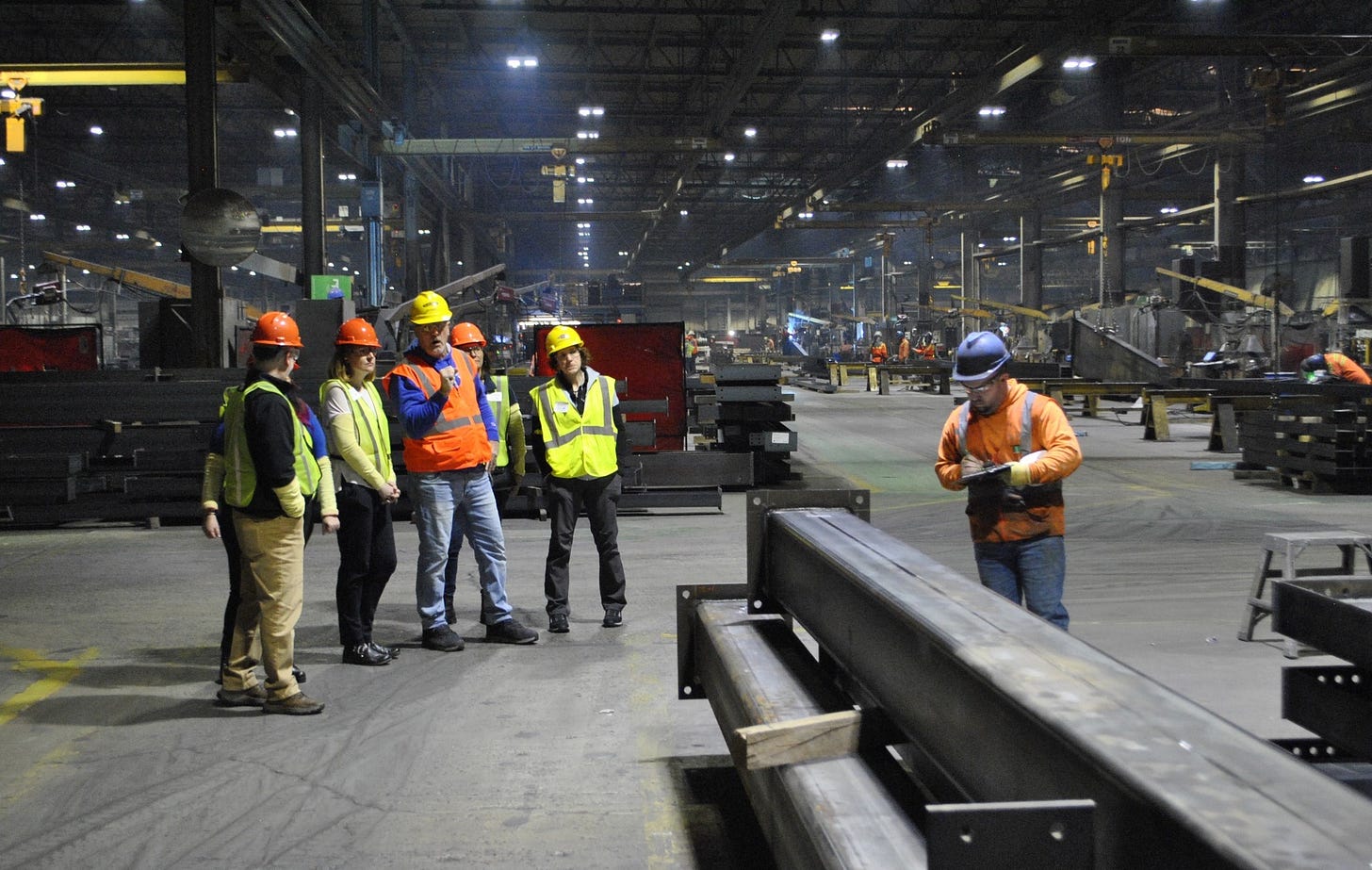Piss Pots and Yeller Dogs
A man in the back raised his hand. Didn’t recognize the bearded face. Wore a flannel shirt, jeans, work boots, more or less how everyone else in the room was dressed, except for the women, they weren’t wearing steel toes.
“Did you know a Charlie McCabe?” he asked. I did, my dad. The man’s face lit up. Went on to say he’d worked with him in this factory, many years before this picture was taken.
The thing he remembered most about my dad was he always had a cigar in his mouth but never lit it, just chewed on it. I asked the man if he knew why that was. He shook his head. It was something Dad started doing on the front lines of the second world war. Steadied his nerves under the near-constant threat of death, while providing some measure of protection. You see, he couldn’t light up for fear of giving away his company’s position to enemy soldiers, took to chewing on cigars instead. Became a lifelong habit.
Dad was tough as nails, hands calloused by manual labor, soul hardened by adversity. When he was only 14, he lost his father, had no choice but to drop out of school to provide for his mother and three sisters. Then the Great Depression claimed the family’s farm. Having lost pretty much everything they owned, he went off to war, nearly lost his life, came home with battle scars both visible and masked along with a Bronze Star he buried out of sight.
After the war, he married and went to work as a tenant farmer, known at the time as farming on halves, the northern equivalent of sharecropping in the Deep South. Dad worked the land, tended the herd, the landlord got half of any proceeds. My parents scrimped and saved until they could afford a down payment on a small dairy farm. To make ends meet, Dad took a job in that factory, milked the cows before and after each shift, used the vacation time that came with his job to plant and harvest crops, did the rest of the farm work on weekends or whenever else he had a few spare hours.
During my entire childhood, I only remember my dad taking an entire day off one time, to travel 200 miles to see my youngest sister get married. Otherwise, he worked every day, seven days a week, on Easter, Thanksgiving, even Christmas, typically starting before the sun rose and not stopping until after sunset.
Dad wasn’t one to express caring to those near and dear, but he did care. At the slightest hint of a lack of initiative on my part, he would light into me, his go-to move being motivation through insult. “You’ll never have a pot to piss in or a window to throw it out of,” he’d growl. If I left him the least bit unsure he was getting through to me, he’d grow exasperated and mutter, “I oughta trade you off for a yeller dog and shoot the yeller dog!”
Those lines appear in no parenting manual, but Dad was no book-learner, he got his child-rearing philosophy from the school of hard knocks. If I heard his estimation of my value or his prediction of my future prospects once, I heard them a thousand times. Didn’t take them seriously, was sure he was just trying to get in my head, how a coach works the referees, hoping for a favorable action down the line. Darned if I didn’t develop quite the work ethic. Never been afraid to get my hands dirty or put in long hours, only fearful my dad might call me a lazy good-for-nothing if he were still with us.
All this makes what I’m about to say feel a bit strange, but here goes. One of the best things our country could do right now is shorten the workweek. Working 9 to 5 with only weekends off was a manageable enough arrangement in a time that has passed us by, my dad’s days are gone, the economy has changed, the world has changed. The standard 8-hour workday and 40-hour workweek date back nearly a century, yet we act like it’s always been this way—it hasn’t—and needs to stay this way forever. It can’t, not without increasingly dire consequences.
With today’s economy, few families can get by with a single breadwinner; two-income households are the norm now. But with both parents typically in the workplace, caring for children has grown infinitely more challenging. Institutional child care costs a fortune, straining family budgets to the breaking point. With stresses mounting, mental health becomes more fragile and sometimes snaps. The percentage of adult Americans diagnosed with depression is at its highest recorded level and continues to increase. The nation’s suicide rate also is increasing, to the point where there are twice as many suicides in the United States as there are homicides.
Iceland has responded to the need to adapt to changing times and an ever-evolving economy, helping families rediscover work-life balance by shortening work hours to magnificent effect. Transitioning to a nationwide four-day workweek was done without any loss in pay or reduction in benefits, has improved job satisfaction and reduced workplace stress. Workers feel less at risk of burnout, and say their health and work-life balance have improved. They also report having more time to spend with their families, do hobbies and complete household chores.
Naysayers warned the move would lead to plummeting productivity and economic stagnation. Hasn’t happened. Iceland’s economic growth has outpaced other European countries and its unemployment rate is one of the lowest in Europe. Worker productivity has stayed the same or even improved.
Dad taught me the value of an honest day’s work. Iceland is showing that in our day and age there is even greater value in fewer of them.




